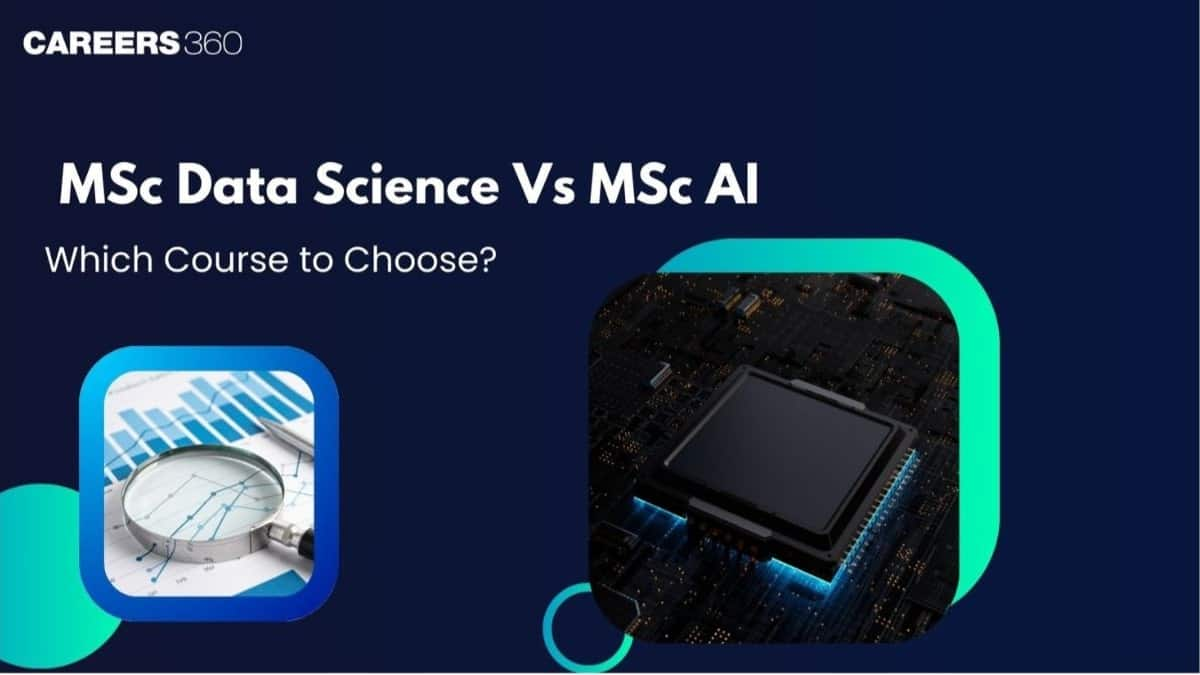M.Sc. Data Science vs M.Sc. Artificial Intelligence: Understand the Key Differences
MSc Data Science and MSc Artificial Intelligence are the two postgraduate programmes. Candidates who want to start a career in tech, Data Science and Artificial Intelligence are the two most common and sought-after courses among Science students. Data Science and Artificial Intelligence are the two most powerful tools for businesses to enhance their productivity and innovation. In this article, we will write about similarities and differences between an M.Sc. in Data Science and an MSc in Artificial Intelligence.
Course Curriculum: M.Sc. Data Science vs M.Sc. Artificial Intelligence

M.Sc. in Data Science is a postgraduate programme of two-year duration which focuses on data collecting, cleaning, analyzing, and interpreting large datasets to get insights. The course curriculum includes:
- Big-Data Analytics
- Statistical Inference
- Blockchain Technology
- Data Structures and Algorithms
- Data Mining and Machine Learning
- Programming Languages like Python, R, and SQL
M.Sc. in Artificial Intelligence is a two-year-long postgraduate course that emphasizes creating a system that can perform various tasks requiring human intelligence. M.Sc. in Artificial Intelligence course curriculum covers:
- Advanced Machine Learning
- Deep Learning and Neural Networks
- Natural Language Processing (NLP)
- Computer Vision
- Robotics
- AI Ethics and Applications
Eligibility Criteria: M.Sc. Data Science vs M.Sc. Artificial Intelligence
The eligibility criteria for M.Sc. Data Science and M.Sc. Artificial Intelligence courses are similar. A few colleges offer this course as a sub-specialisation of Computer Science Engineering (CSE). Both courses are offered together by a few universities. In this section, we have mentioned the M.Sc. in Data Science and M.Sc. in Artificial Intelligence eligibility criteria.
- Candidates need to complete a bachelor's degree programme in Computer Science, Mathematics, Engineering, or related fields.
- They should have a sound knowledge of programming and mathematics.
- Candidates should have passed 10+2 with a minimum of 50 per cent mark.
- They need to appear for the CUET PG, IIT JAM, and GATE entrance exams.
Fees: M.Sc. Data Science vs M.Sc. Artificial Intelligence
M.Sc. in Data Science courses are offered by a lot of private and government colleges in India. In the table below, we have mentioned a few M.Sc. in Data Science colleges and their fees.
MSc Data Science Colleges | Fees |
|---|---|
Rs. 3.85 lakhs | |
Rs. 2.40 lakhs | |
Rs. 2.15 lakhs | |
Rs. 3.45 lakhs | |
Rs. 1.60 lakhs |
M.Sc. in Artificial Intelligence is a two-year undergraduate course that is offered by various colleges. In the table below, we have mentioned the M.Sc. in Artificial Intelligence colleges and their fees.
MSc Artificial Intelligence Colleges | Fees |
|---|---|
Rs. 4.07 lakhs | |
Rs. 99,000 | |
Rs. 31,480 | |
Rs. 43,490 | |
Sri Ramachandra Faculty of Engineering and Technology, Chennai | Rs. 1.56 lakhs |
Career Options: M.Sc. Data Science vs M.Sc. Artificial Intelligence
M.Sc. in Data Science graduates can work in industries like finance, healthcare, marketing, and technology. MSc Data Science salary can range from Rs. 8- Rs. 12 LPA, which can grow depending on experience, location, and company. Popular roles include:
- Data Scientist
- Data Analyst
- Business Analyst
- Data Engineer
M.Sc. in Artificial Intelligence graduates often find opportunities in cutting-edge technology and R&D. Entry-level M.Sc. in Artificial Intelligence salary is Rs. 6 LPA to Rs. 14 LPA. Some of the M.Sc. in Artificial Intelligence career options are:
- Machine Learning Engineer
- AI Specialist
- Robotics Engineer
- AI Researcher
Conclusion
Both the MSc in Data Science and the MSc in Artificial Intelligence have different benefits. Data science is a better option if you want to work with data and extract insights to address business issues. AI, on the other hand, can be selected if they want a career in developing intelligent systems and investigating robotics and machine learning.
Popular Courses and Specializations
Popular Branches
Popular Courses
- MA in Public Administration Course, Admissions, Eligibility, Syllabus, Fees, Career
- 30+ Job Opportunities After MA
- M.Sc Mathematics Course, Admissions, Eligibility, Syllabus, Fees, Career
- MA History Course, Admissions, Eligibility, Syllabus, Fees, Career
- MSc in Biotechnology Course, Eligibility, Fees, Admission, Syllabus, Jobs, Scope
List of M.Sc. colleges
Questions related to M.Sc.
On Question asked by student community
The MSCE answer key 2026 of class 8th can be checked in the article below.
To apply for MSc Forestry programme, candidates need to have a B.Sc. or an equivalent degree from a recognised institution in a relevant discipline with at least 50% marks.
You need to visit the official website of institute for which you are looking for admission and fill out the application
You can choose subjects such as Zoology, Biotechnology, Life Sciences, Anatomy, Physiology, or related Biological Sciences in your BSc program. It makes you suitable for M.Sc. in Clinical Embryology at AIIMS Delhi provided you meet other eligibility conditions.
Hey Santhyaa, if you are planning for admission to the MSc allied course, then must appear in the National Eligibility-cum-Entrance Test (NEET-UG) 2026.
To take admission in MSc in Geophysics, you need to have completed a BSc degree in subjects like Physics, Mathematics, Geology, or other related science subjects from a recognised university. Most colleges give admission based on entrance exams such as IIT JAM or their own university tests. Your marks in
Applications for Admissions are open.
Among top 100 Universities Globally in the Times Higher Education (THE) Interdisciplinary Science Rankings 2026
Amity University-Noida M.Sc Admissions 2026
ApplyAmong top 100 Universities Globally in the Times Higher Education (THE) Interdisciplinary Science Rankings 2026
IIHS University Admissions 2026
ApplyMaster's programs in Sustainability Science and Practice; Climate Change Science and Practice; Urban Economic and Infrastructure Development; Human Development Policy and Practice
Victoria University, Delhi NCR
ApplyApply for UG & PG programs from Victoria University, Delhi NCR Campus
Chandigarh University Admissions 2026
ApplyNAAC A+ Accredited | Among top 2% Universities Globally (QS World University Rankings 2026)
Karnavati University B.Sc Admissions 2026
Apply100% Placements Assistance | 1200+ Recruiters
